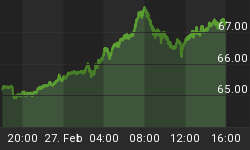The good news is:
• Nothing about the decline of the past week suggests that it is anythingbut a routine pullback in an advancing market.
All of the short term indicators cast doubt on the above statement.
My favorite is the NASDAQ new high indicator, a 10% trend (19 day EMA) of NASDAQ new highs. The indicator shown in green in the chart below continued to fall on both of last weeks up days. The current value of the indicator is 76 so it will take more than 76 new highs on the NASDAQ to turn the indicator upward.

For a slightly longer term view, summation indices (SI) calculated from advancing and declining issues, upside and down side volume and new highs and new lows do a good job of ironing out the day to day wiggles.
The chart below shows all of the SI's calculated from NASDAQ data are heading downward.

To me, talk of Fibonacci retracement levels often sounds like a conspiracy theory. The orderliness of the advance off the August low prompted me to look at Fibonacci levels of the advance from the August low. The decline from the September 21 high to the September 27 low was 38% of the advance from the August 12 low, a significant Fibonacci level. The decline to last Thursday's low (if it holds) was a 61% retracement of the advance from the September 27 low to the October 6 high, another significant Fibonacci level. All of this occurred within a standard error channel shown on the chart below.

Seasonally the week after options expiration in October is a little weak. Three of the last four of the weeks after October options expiration in the fourth year of the presidential cycle have been down.
Report for the week after witching Friday during Oct
Witching is futures and options expiration the 3rd Friday of the month.
The number following the year is the position in the presidential cycle.
| R2K | Mon | Tue | Wed | Thur | Fri | Totals |
| 1988-4 | -0.19% | -0.14% | -0.21% | -0.99% | 0.34% | -1.20% * |
| 1989-1 | -0.66% | -1.36% | 0.28% | -0.83% | -1.08% | -3.66% |
| 1990-2 | -0.43% | 0.56% | -0.02% | 0.11% | -1.24% | -1.02% |
| 1991-3 | -0.25% | 0.02% | -0.02% | -1.14% | -0.51% | -1.91% |
| 1992-4 | 1.05% | 0.41% | 0.57% | -0.15% | 0.33% | 2.22% * |
| 1993-1 | -0.16% | -1.39% | -0.36% | 0.07% | 0.23% | -1.61% |
| 1994-2 | -0.50% | -0.41% | 0.10% | 0.57% | 1.09% | 0.85% |
| 1995-3 | -0.57% | -0.08% | -1.00% | -1.08% | -0.03% | -2.76% |
| 1996-4 | -0.50% | -0.95% | 0.03% | 0.04% | -0.03% | -1.41% * |
| 1997-1 | 1.01% | 1.12% | -0.15% | -1.94% | -0.38% | -0.33% |
| 1998-2 | 2.79% | 1.66% | 0.45% | 1.79% | 0.18% | 6.88% |
| 1999-3 | -1.40% | 0.50% | 0.73% | 0.08% | 1.07% | 0.98% |
| 2000-4 | 0.51% | -0.43% | -2.59% | 0.95% | 0.02% | -1.53% * |
| 2001-1 | 1.13% | -0.73% | 0.07% | 1.94% | 0.62% | 3.03% |
| 2002-2 | 1.45% | -1.62% | 1.73% | -0.79% | 1.81% | 2.58% |
| 2003-3 | 0.21% | 0.78% | -2.36% | -0.52% | -0.80% | -2.68% |
| Avg | 0.22% | -0.13% | -0.17% | -0.12% | 0.10% | -0.10% |
| Win% | 44% | 44% | 50% | 50% | 56% | 38% |
| SPX | Mon | Tue | Wed | Thur | Fri | Totals |
| 1988-4 | -0.49% | 0.04% | -0.35% | -1.46% | 0.45% | -1.81% * |
| 1989-1 | -0.67% | -0.33% | -0.35% | -1.33% | -0.85% | -3.53% |
| 1990-2 | 0.73% | -0.76% | 0.08% | -0.78% | -1.76% | -2.49% |
| 1991-3 | -0.63% | -0.56% | 0.03% | -0.74% | -0.23% | -2.13% |
| 1992-4 | 0.79% | 0.12% | 0.05% | -0.19% | -0.19% | 0.58% * |
| 1993-1 | -0.22% | -0.48% | -0.03% | -0.15% | -0.45% | -1.33% |
| 1994-2 | -0.87% | 0.15% | 0.24% | 0.70% | 1.70% | 1.91% |
| 1995-3 | -0.41% | 0.26% | -0.70% | -0.99% | 0.52% | -1.32% |
| 1996-4 | -0.14% | -0.46% | 0.10% | -0.70% | -0.20% | -1.40% * |
| 1997-1 | 1.21% | 1.74% | -0.39% | -1.84% | -0.95% | -0.22% |
| 1998-2 | 0.57% | 0.14% | 0.56% | 0.80% | -0.72% | 1.35% |
| 1999-3 | 0.54% | 0.57% | 2.23% | -0.45% | 1.41% | 4.29% |
| 2000-4 | -0.08% | 0.17% | -2.38% | -0.03% | 1.11% | -1.21% * |
| 2001-1 | 1.53% | -0.47% | 0.04% | 1.37% | 0.41% | 2.88% |
| 2002-2 | 1.73% | -1.06% | 0.67% | -1.52% | 1.72% | 1.54% |
| 2003-3 | 0.52% | 0.13% | -1.50% | 0.33% | -0.47% | -0.99% |
| Avg | 0.26% | -0.05% | -0.11% | -0.44% | 0.09% | -0.24% |
| Win% | 50% | 56% | 56% | 25% | 44% | 38% |
The short and intermediate term indicators and seasonality suggest next week will be, at least, slightly down. The week needs to be up if the Fibonacci levels and error channel are going to hold.
I expect the major indices to be lower on Friday October 22 than they were on Friday October 15.
My positive forecast for last week was a miss. Seasonally, Monday should have been strong enough to carry the week to a gain. Monday, although up, was disappointing and the rest of the week followed Monday's lead.















